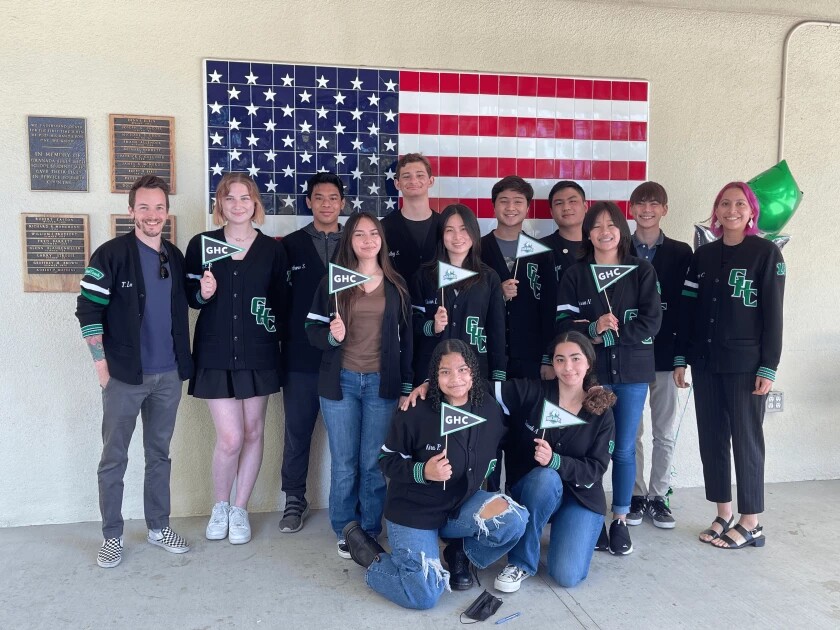This story is free to read because readers choose to support LAist. If you find value in independent local reporting, make a donation to power our newsroom today.
Morning Brief: College’s ‘Hidden Curriculum,’ Rattlesnake Bites, And Decathalon Champs

Good morning, L.A. It’s April 27.
Applying for college has become a labyrinth of tests, applications, housing, and of course, financing. But once students arrive at school, the maze doesn’t end — my colleague Jill Replogle reports that upon getting to campus, young people face what’s known as the hidden curriculum.
The term refers to everything from knowing about office hours to finding parking to locating free printing services. Basically, it’s all the things that may seem second nature to students who come from backgrounds where college is more than common— and that may seem completely foreign to students who are the first in their families to attend a university.
"The hidden curriculum is the rules of the game that some people get the rulebook for and some other people don't,” said Aireale Rodgers, a doctoral candidate at the University of Southern California whose work focuses on equity in higher education.
In a new LAist series, Jill tells the stories of students who’ve had to learn about the hidden curriculum on their own, and figure out ways to navigate it. In doing so, she hopes to make it… well, less hidden.
About How to LA Newsletter
This is the web version of our How To LA newsletter. Sign up here to get this newsletter sent to your inbox each weekday morning
There’s Sammie Zenoz, who was determined to work her way out of waitressing and ended up at the University of Southern California. There’s Tatum Tricarico, who became legally blind in high school and went on to attend graduate school at Duke University. And there’s Patty Lozano, a mother of two and student at Santa Monica College who’s working towards becoming a certified public accountant.
Each student encountered unique obstacles and had to find their way around them.
Activists say some schools are doing a better job of relinquishing the in-language and exclusive policies that seem to come standard on many college campuses — but there’s still a long way to go.
Keep reading for more on what’s happening in L.A., and stay safe out there.
What Else You Need To Know Today
- The city of L.A. is launching a mobility pilot program in South L.A. that would give some residents $150 per month for transit services.
- Young Latino and Black people experiencing homelessness drove L.A. County’s recent increases in fatal overdoses, which is the main death cause among the unhoused.
- L.A. County has been given the dubious honor of having the highest level of year-round, street-level smog pollution.
- L.A. Sheriff Alex Villanueva said that a commander’s whistleblower lawsuit, which accuses Villanueva of covering up a video of a deputy kneeling on a man's head for nearly 3 minutes, is full of "false claims.”
- The Princess Bride star Cary Elwes was bitten by rattlesnake outside his Malibu home. He says he's "recovering well." Here’s what to do if you’re in the same situation.
- Elon Musk has bought Twitter. We take a look at what's next.
- Most people in the United States, including most children, have now been infected with the coronavirus, according to a new study from the Centers for Disease Control and Prevention.
Before You Go ... Go Grenada Hills! A Local Charter Took Home Top Prize At The U.S. Academic Decathalon

How much do you know about water? Chances are, it’s less than the Granada Hills Carter’s U.S. Academic Decathalon team, which took home first place at this year’s competition, themed: "California - Water: A Most Essential Resource."
It’s the second year in a row that the nine-member team has won the top honor, completing multiple-choice exams, essays and speeches. Calling the win “a great accomplishment,” team coach Tyler Lee added that the most important thing was that all the students learned a lot.
Help Us Cover Your Community
Got something you’ve always wanted to know about Southern California and the people who call it home? Is there an issue you want us to cover? Ask us anything.
Have a tip about news on which we should dig deeper? Let us know.







